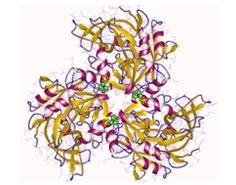Defects in cellular apoptosis and proliferation play an important role in tumor pathogenesis allowing neoplastic cells to survive beyond their normal intended lifespan. Our earlier studies indicate an inhibition of cell death, enhancement of proliferation and frequent overexpression of p53, bcl-2 and bax, members of the p53-dependent apoptotic pathway in the transition from oral lesions to oral cancer. The present project proposes to determine the expression pattern of apoptotic genes involved in the intrinsic and extrinsic cell death pathways (Fig.1) (viz. Bcl2, Fas, Caspase, IAP families) in oral cancer cell lines (FBM, Gurav and Dwivedi) and tumor tissues using the Ribonuclease protection assay. A high expression of anti-apoptotic Mcl-1 and bcl-xL, DISC components of the Fas pathway, cytokine activating caspase 4, survivin, p53 & p16 genes (Fig.2) was observed in all the oral cell lines while the oral tumors (25) differed by high expression of Bfl-1, DISC components of the TRAIL pathway, p21 & p27 genes. Cluster analysis revealed clustering of aggressive tumors with high expression of bcl-2 family members (Fig.3). Elevated Mcl-1, bcxl, survivin, p53 and p16 transcripts and protein were demonstrated in the cell lines by RT-PCR and western blotting/IHC respectively. Our studies demonstrate that apoptosis regulators and both the intrinsic and extrinsic apoptosis pathways appear to be deregulated in oral cell lines and several oral tumors, which may contribute to evasion of apoptosis and pathogenesis of oral cancers. Identification and assessment of the radiation response/ resistance associated genes in human oral tumors /cell lines has been initiated.


